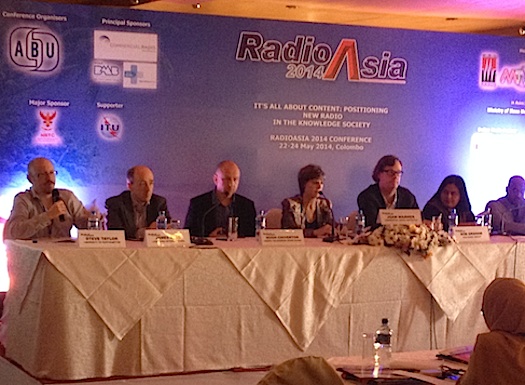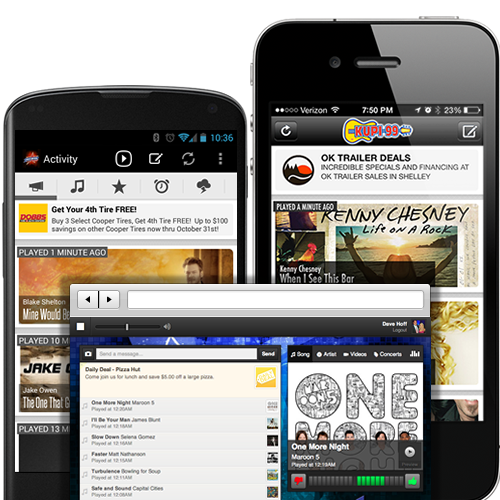“People are accessing radio in new ways now, through apps and through mobile, This is an opportunity for radio to step out of the shadows,” Steve Taylor told the Radio Asia conference in Sri Lanka.
Mobile Media
Taylor, a former broadcaster at London’s XFM, now teaching at the University of Northampton, said social media and smart mobile devices have given radio the opportunity to speak to listeners in a new way, helping it get back to its role as a music recommendation medium and as a medium for dialog.
“Even though anyone can do that now on social media, people who work in radio know well how to engage with audiences, so we can do it better than most,” he said.
In the panel discussion, chaired by CRA’s Joan Warner, talk centred about radio’s role in enhancing ‘the knowledge society’ and ranged across new and old media devices.
The latest information from India was presented, where about 50% of the population listen to free to air radio on their FM chip enabled phones. While this segment of the Indian market is listening on dumb phones, there is a parallel push in more developed markets to get free to air receiver chips into smart phones, such as in Australia, where the radio industry is focusing on getting free to air radio listening into phones. CRA is actively discussing the inclusion of digital radio chips into smart phones.
In another session, an example of the success of NHK’s radio app reinforced the importance of apps to radio broadcasters.
Asia Radio Today’s James Ross, who lives in Hong Kong, discussed his morning listening routine, saying that his regular radio listening habits at home had not changed, but when he travels to work on the city’s metro system, he now listens to the radio through apps on his smart phone.
“There’s so many screens about in the world now, I spend a lot of time trying to actively avoid looking at a screen, so I listen to the radio wherever and whenever I can,” said Ross.
Discussing the Australian experience Warner told delegates that, despite so many more media choices available to consumers now, time spent listening to radio has not dropped much, and is only down by 10 minutes per week compared with past decades.
Radio’s part in the knowledge society
RTHK’s Hugh Chiverton posed the question to delegates, “you can measure how much information is out there, but how can you measure knowledge?” His point was that there is lots of information in the world today, but that broadcasters should be helping people to sort and make sense of that information so that it turns into knowledge that will enrich the planet for the better.
“Live radio is a place where people can do something with the information they receive to generate knowledge… Humans like talking, so radio will never go away,” he said.
In all the discussion about new devices, it was sobering to hear from the producer of a BBC Media Action funded program that targets underprivileged women in media dark areas of India. Because there is very little media in their villages, they gather round the radio in listening clubs each week and the information in the show aims to help them change their communities for the better. It was a grass roots example of how knowledge received through radio is giving people the chance to make life better for themselves, even in the most underdeveloped parts of the world.
The difference between radio and streaming music services
Rob Graham, an Australian now running the EON Media company in Singapore, made the point that the algorithms used on streaming services such as Pandora, Spotify, and others cannot predict a hit. “The people involved in music radio have the expertise to predict hits and help listeners discover good new music, streaming services can’t do that.”
Graham’s company produces Asia Pop 40 one of Asia’s first syndicated radio shows.
A new tool for radio companies to more effectively use their social media connections with listeners was also discussed. Commotion is a tool for integrating social networking into your station.
The Commotion platform is a real-time “Hang-Out” for your audience no matter where your listener is (on the web, in their car, on their phone). It allows them to engage directly with each other and the station in real-time, on a platform you own and control. Every vote, comment, contest… is used to build a user profile. Commotion users have reported increased ratings of up to 120% and dramatic increases in listener engagement.


